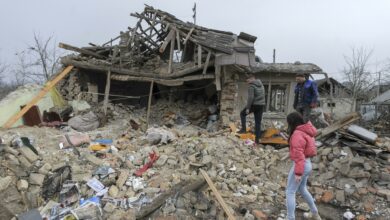The ethnic Hungarian fighting Russians, disinformation in Ukraine

By Rostyslav Averchuk
Lviv, Ukraine, Jan 25 (EFE).- While Hungary has frequently acted as a roadblock to foreign aid initiatives and accuses Ukraine of suppressing the Hungarian minority in Zakarpattia, ethnic Hungarian Viktor Troshki is helping Ukrainian forces repel the Russian invasion.
When the Russian invasion of Ukraine started last year, Troshki decided to take a break from his job as a mathematics professor at a local university to enlist in the Ukrainian army.
“I only started looking into the recent news about Ukrainian-Hungarian relations recently, after receiving calls from Hungarian journalists,” Troshki tells Efe.
Having received an award from the Hungarian Academy of Science for its research in March, he quickly became the point of reference for people in Hungary wanting to find out whether the information provided by various members of the Viktor Orban government about discrimination of ethnic Hungarians in Ukraine was true.
“Suffice it to say that I taught classes in Hungarian in the main university of the (Zakarpattia) region,” Troshki says, refuting claims that the minority’s rights to use their language are being limited.
“Ethnic Ukrainians and Hungarians would live in complete peace and unity if not for the involvement of politicians,” he adds.
Troshki explains that he has always been open about his ethnicity and has never experienced any discrimination because of it.
Zakarpattia, which used to belong to the Austrian-Hungarian empire, Czechoslovakia, Soviet Union and Ukraine, has been home to up to 150,000 Hungarians along with more than 1 million Ukrainians.
Born into a Hungarian family in a village near the regional capital Uzhhorod, Troshki’s grandmother would tell him stories of how his family suffered at the hands of the Red Army after it arrived in the region in 1944.
His grandfather was repressed and deported to Donbas because of his Hungarian ethnicity, while towns and villages were pillaged – just like in Ukraine’s Bucha in 2022.
Troshki wanted to do anything in his power to prevent the Russian army from reaching his home again.
Although university professors are exempt from military service under martial law, and despite his total lack of military background, Troshki volunteered to join the army.
He was assigned to an artillery unit, and has since moved along various locations on the frontline in the south and east of Ukraine.
Troshki tries to remain in touch with his wife and two children as often as he can amid the rolling emergency blackouts due to Russian missile strikes against Ukraine’s civilian energy infrastructure.
Staying connected is a top priority for the military that usually have reliable internet access thanks to power generators and accumulators, while his family spends up to six hours with no electricity and connection at home.
“Though it’s me who is on the frontline, it’s harder for me to get in touch with the family now”, he says.
“Everyone is waiting for the war to end as soon as possible so they can hug their loved ones at home,” says Troshki, who has only been able to see his family once since the war began 11 months ago.
“I used to think that the idea that Ukraine was protecting the whole of Europe was an exaggeration, a rhetorical embellishment, but I have since changed my mind,” he says.
“Seeing Russians employ terror against civilians, I am not sure that other countries, especially smaller than us, could weather it.”





